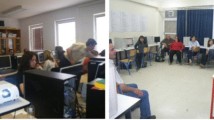Abstract
This study focuses on determining the ratio between face-to-face learning and online learning and points out the main factors affecting the training process of primary school teachers in Vietnam according to the teaching model combined blended learning. The authors conducted a survey using a questionnaire and conducted in-depth interviews with lecturers who are teaching at universities that train primary school teachers in many provinces and cities across the country. The results show that the views on the ratio between face-to-face and online learning in training units are different. Many lecturers believe that face-to-face teaching is favorable for training professional skills for primary school teachers, so the online learning should be limited in the training process. However, some lecturers believe that information technology is becoming increasingly important in education. Therefore, blended learning is an inevitable trend in teacher training. When discussing the factors affecting the teaching process by blended learning model, most of the lecturers think that technological factors and the skills of teachers and learners in using information technology are important roles. Finally, the study shows the most suitable ratio between face-to-face and online learning to make the process of training primary teachers under the blended teaching model more effective and, at the same time, offers a few suggestions to help lecturers improve the effectiveness of the blended learning process.
Access this chapter
Tax calculation will be finalised at checkout
Purchases are for personal use only
Similar content being viewed by others
References
Directive No. 16/CT-TTg dated May 4, 2017 of the Prime Minister on strengthening the competency to access the 4th industrial revolution, p. 1.
Ministry of Education and Training. (2018). General education program, p. 5.
Circular No. 13. (2018). Promulgating Law Course Curriculum, Ministry of Labour, Invalids and Social Affairs, p. 1.
Circular No. 11. (2018). Promulgating Informatics Subject Programs, Ministry of Labour, Invalids and Social Affairs, p. 1.
Circular No. 03. (2019). Promulgating English Subject Program, Ministry of Labour, Invalids and Social Affairs, p. 1.
Circular No. 12. (2018). Promulgating the Physical Education Subject Program, Ministry of Labour, Invalids and Social Affairs, p.1
Circular No. 10. (2018). Regulations on the program, organization of teaching and assessment of learning results in the subject of National defense and security education, p. 1.
Graham, C. R., Woodfield, W., & Harrison, J. B. (2013). A framework for institutional adoption and implementation of blended learning in higher education. The Internet and Higher Education, 18, 4–14.
Barbour, M. K. (2011). State of the nation study: K-12 online learning in Canada. Vienna, VA: International Council for K-12 Online Learning, p. 23.
Banados, E. (2006). A blended learning pedagogical model for teaching and learning EFL successfully through an online interactive multimedia environment. CALICO Journal, 23, 533–550.
Hoai, H. T. T., & Thao, T. T. (2019). Application of blended teaching approach in higher education—A solution for large classes, science and technology magazine. Thai Nguyen University, 199(06), 87–92.
Lazarinis, F., Karachristos, C. V., Stavropoulos, E. C., & Verykios, V. S. (2019). Education and Information Technologies, 24, 1237–1249.
Bedi, K. (2008). Experiences of hybrid corporate training programmes at an online academic institution. In International Conference on Hybrid Learning and Education (pp. 271–282). Springer, Berlin, Heidelberg. https://doi.org/10.1007/978-3-540-85170-7_24
Dam, Q. V., & Yen, N. T. H. (2017). The trend of applying the Blended learning model in higher education and the possibility of its implementation at the National Economics University. In Proceedings of the National Scientific Conference “Online training in the period of industrial revolution 128” - National Economics University, p. 25.
Vu Thi Minh, T. (2020). Blended learning and applicability at Hung Vuong University. Journal of Science, No 37/2020.
Author information
Authors and Affiliations
Corresponding author
Editor information
Editors and Affiliations
Rights and permissions
Copyright information
© 2023 The Author(s), under exclusive license to Springer Nature Singapore Pte Ltd.
About this paper
Cite this paper
Pham, T.Q., Dang, T.M., Van Nguyen, H., Nguyen, H.T. (2023). Training Elementary Teachers in Vietnam by Blended Learning Model. In: Peng, SL., Jhanjhi, N.Z., Pal, S., Amsaad, F. (eds) Proceedings of 3rd International Conference on Mathematical Modeling and Computational Science. ICMMCS 2023. Advances in Intelligent Systems and Computing, vol 1450. Springer, Singapore. https://doi.org/10.1007/978-981-99-3611-3_18
Download citation
DOI: https://doi.org/10.1007/978-981-99-3611-3_18
Published:
Publisher Name: Springer, Singapore
Print ISBN: 978-981-99-3610-6
Online ISBN: 978-981-99-3611-3
eBook Packages: Intelligent Technologies and RoboticsIntelligent Technologies and Robotics (R0)




